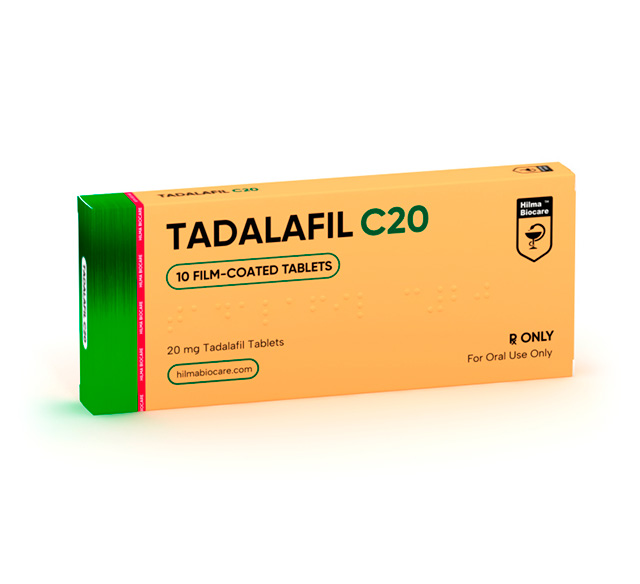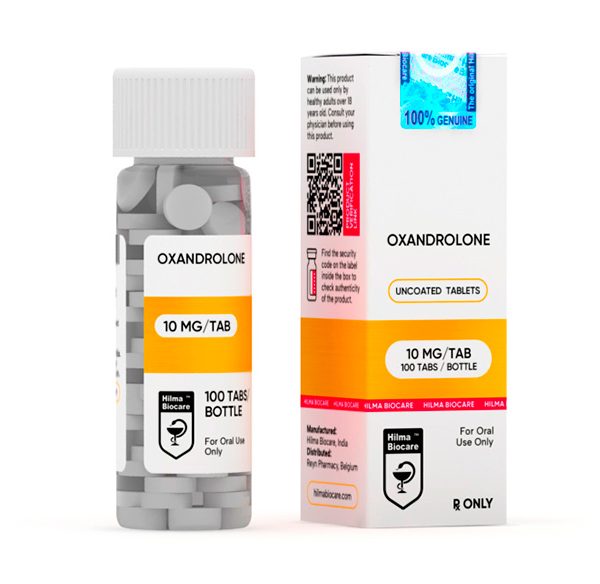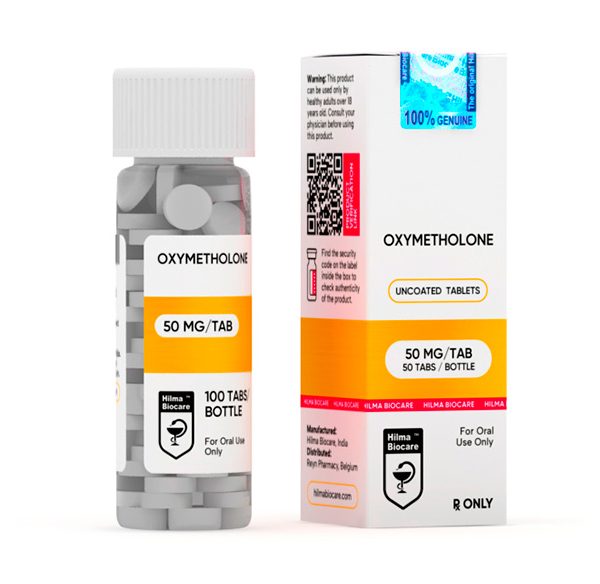TADALAFIL C20 (CIALIS)
Manufacturer: Hilma Biocare
Pack: 10 tabs/pack (20 mg/tab )
Drug class: phosphodiesterase type 5 inhibitors (PED5 Inhibitor)
Common names: Adcirca,Cialis, Adcirca, Tadacip and others
Chemical structure: pyrazino[1′;,2′;:1,6]pyrido[3,4-b]indole-1,4-dione, 6-(1,3-benzodioxol-5-yl)2,3,6,7,12,12a-hexahydro-2-methyl-, (6R,12aR)
DESCRIPTION
Tadalafil C20 is a phosphodieste- rase 5 (PDE5) inhibitor indicated for the treatment of
erectile dys- function (ED) and the signs and symptoms of benign prostatic hyperplasia
(BHP).
DOSAGE AND ADMINISTRATION
The recommended starting dose of Tadalafil for use as needed in most patients is 10 mg,
taken prior to anticipated sexual activity. The dose may be decreased to 5 mg or increased
to 20 mg, based on individual efficacy and tolerability. The maximum recommended do- sing
frequency is once per day in most patients. Tadalafil for use as needed was shown to
improve erectile function up to 36 hours following dosing.
CONTRAINDICATIONS
Tadalafil is not indicated for use in females and pediatric patients. Administration of Tadalafil
to pa- tients using any form of organic nitrate is contraindicated. Tadalafil was shown to
potentiate the hypo- tensive effect of nitrates.
WARNINGS AND PRECAUTIONS
Patients should not use Tadalafil C20 if sex is inadvisable due to cardio- vascular status. Use of
Tadalafil with alpha-blockers, antihyperten- sives or substantial amounts of alcohol may lead
to hypotension. Caution is advised when Tadalafil 15 Used as a treatment for ED in men
taking alpha-blockers. Patients should seek emergency treatment if an erection lasts >4
hours. Use Tadalafil with caution in patients predisposed to priapism. Patients should stop
Tadalafil and seek medical care if a sudden loss of vision occurs in one or both eyes, which
could be a sign of non-arteritic anterior ischemic op- te neuropathy (NAION). Tadalafil should
be used with caution, and only when the anticipated benefits outweigh the risks, in patients
with a history of NAION. Patients should stop Tadalafil C20 and seek prompt medical attention in
the event of sudden decrease or loss of hearing. Prior to initiating treatment with Tadalafil for
BPH, consideration should be given to other urological conditions that may cause similar
symptoms.
USE IN SPECIFIC POPULATIONS TADALAFIL C20
Of the total number of subjects in ED clinical studies of Tadalafil, approximately 19 percent
were 65 and over, while approximately 2 percent were 75 and over. Of the total number of
subjects in BPH clinical studies of Tadalafil C20 (inclu- ding the ED/BPH study), approxi- mately
40 percent were over 65, while approximately 10 percent were 75 and over. In these clinical
trials, no overall differences in efficacy or safety were observed between older (>65 and >75
years of age) and youn- ger subjects (< 65 years of age). Hepatic Impairment In clinical pharmacology studies, Tadalafil exposure (AUC) in sub- jects with mild or moderate hepatic impairment (Child-Pugh Class A or B) was comparable to exposure in healthy subjects when a dose of 10 mg was administered. There are no available data for doses higher than 10 mg of Tadalafil in patients with hepatic impairment. Insufficient data are available for subjects with severe hepatic impairment (Child-Pugh Class C). Renal Impairment In clinical pharmacology studies using single-dose Tadalafil (5 10 mg), Tadalafil exposure (AUC) doubled in subjects with creatinine clearance 30 to 80 mL/min. In sub- jects with end-stage renal disease on hemodialysis, there was a two- fold increase in Cmax and 2.7- to 4.8-fold increase in AUC following single-dose administration of 10 or 20 mg Tadalafil. Use with Food Tadalafil C20 may be taken without regard to food. ADVERSE REACTIONS TADALAFIL C20 Most common adverse reactions (> 2%) include headache, dyspep- sia, back pain, myalgia,
nasal con- gestion, flushing, and pain in limb. Additional, less frequent adverse reactions
(<1%) reported in the controlled clinical trials of Tadalafil for BPH or ED and BPH included:
gastroesophageal reflux disease, upper abdominal pain, nausea, omitting, arthralgia, and
muscle spasm, Back pain or myalgia generally occurred 12 to 24 hours after dosing and
typically resolved within hours. The back pain/myalgia associated with Tadalafil treatment
was characterized by diffuse bi- lateral lower lumbar, gluteal, thigh, or thoracolumbar
muscular dis- comfort and was exacerbated by recumbency. 48 In general, pain was
reported as mild or moderate in severity and resolved without medical treatment, but severe
back pain was reported with a low frequency (<5% of all reports). When medical treatment
was necessary, acetaminophen or non- steroidal anti-inflammatory drugs were generally
effective; however, in a small percentage of subjects who required treatment, a mild narcotic
(e.g., codeine) was used. Overall, back pain and myalgia were reported in 5.5% and 1.3% of
respectively. Diagnostic patients, testing, including measures for inflammation, muscle injury,
or no damage revealed renal evidence of medically significant underlying pathology.
DRUG INTERACTIONS TADALAFIL C20
Potential for Pharmacodynamic Interactions with Tadalafil
Nitrates – administration of Tada- lafil to patients who are using any form of organic nitrate, is
indicated, In a patient who has ta- ken Tadalafil, where nitrate ad- ministration is deemed
necessary in a life-threatening si- tuation, at least 48 hours should elapse after the last dose
of Tada- lafil before nitrate administration is considered. In such circumstances, nitrates
should still only be administered under close medical supervision and hemodynamic
monitoring.
Alpha-Blockers – caution is advi- sed when PDE5 inhibitors are coadministered ckers. PDE5
inhibitors, including Tadalafil, and alpha-adrenergic blocking agents are both vaso- dilators
lowering effects. When vasodi- lators are used in combination, an additive effect on blood
pressure may be anticipated.
Alcohol – both alcohol and Tada- lafil, a PDE5 inhibitor, act as mild vasodilators. When mild
vasodila- tors are taken in combination, blood-pressure-lowering effects of each individual
compound may be increased.
Substantial consumption of alcohol in combination with Tadalafil can increase orthostatic
signs and symptoms, including increase in heart rate, decrease in standing blood pres- sure,
dizziness, and headache. Tadalafil did not affect alcohol plasma concentrations and alco- hol
did not affect Tadalafil plasma concentrations.
Potential for Other Drugs to Affect Tadalafil
Antacids – Simultaneous administ- ration of an antacid (magnesium hydroxide/aluminum and
Tadalafil reduced the appa- rent rate of absorption of Tadalafil without altering exposure
(AUC) to Tadalafil. hydroxide)
H2 Antagonists (e.g. Nizatidine) An increase in gastric pH resulting from administration of
nizatidine had no significant effect on phar- macokinetics.
Cytochrome P450 Inhibitors Tadalafil is a substrate of and by predominantly metabolized
CYP3A4. Studies have shown that drugs that inhibit CYP3A4 can increase Tadalafil
exposure.
CYP3A4 (e.g., Ketoconazole) Ketoconazole (400 mg daily), a selective and potent inhibitor
of CYP3A4, increased Tadalafil 20 mg single-dose exposure (AUC) by 312% and Cmax by
22%, relative to the values for Tadalafil 20 mg alone. Although specific interactions have not
been studied, other CYP3A4 inhibitors, such as erythromycin, itraconazole, and grapefruit
juice, would likely increase Tadalafil exposure.
HIV Protease inhibitor – Ritonavir (500 mg or 600 mg twice daily at steady state), an inhibitor
of CYP3A4, and CYP2D6, increased Tadalafil 20 mg single-dose exposure (AUC) by 32%
with a 30% reduction in Cmax, relative to the values for Tadalafil 20 mg alone. CYP2C9,
CYP2C19, Ritonavir (200 mg twice daily), increased Tadalafil 20-mg single dose exposure
(AUC) by 124% with no change in Cmax, relative to the values for Tadalafil 20 mg alone.
Although specific interac- tions have not been studied, other HIV protease inhibitors would
likely increase Tadalafil exposure.
Cytochrome P450 Inducers – Studies have shown that drugs that induce CYP3A4 can
decrease Tadalafil exposure. CYP3A4 (e.g., Rifampin) – Rifa- mpin (600 mg daily), a
CYP3A4 inducer, reduced Tadalafil 10 mg single-dose exposure (AUC) by 88% and Cmax
by 46%, relative to the values for Tadalafil 10 mg alone.
Potential for Tadalafil to Affect Other Drugs
Aspirin – Tadalafil did not poten- tiate the increase in bleeding time caused by aspirin.
Cytochrome P450 Substrates – Tadalafil is not expected to cause clinically significant
inhibition or induction of the clearance of drugs metabolized by cytochrome P450 (CYP)
isoforms.
Studies have shown that Tadalafil does not inhibit or induce P450 isoforms CYP2C9,
CYP2C19, CYP2D6, and CYP2E1. CYP1A2 Theophylline) significant effect on the pharmacokinetics of theophylline.
CYP2C9 (e.g. Warfarin) Tadalafil had no significant effect on expo- sure (AUC) to S-warfarin
or R- warfarin, nor did Tadalafil affect changes in prothrombin time indu- ced by warfarin.
CYP3A4 (e.g. Midazolam or Lova- statin) – Tadalafil had no significant effect on exposure
(AUC) to mida- zolam or lovastatin.
P-glycoprotein (e.g. Digoxin) Coadministration of Tadalafil (40 mg once per day) for 10 days
did not have a significant effect on the steady-state pharmacokinetics of digoxin (0.25
mg/day) in healthy subjects
OVERDOSAGE TADALAFIL C20
Single doses up to 500 mg have been given to healthy subjects, and multiple daily doses up
to 100 mg have been given to patients. Adverse events were similar to those seen at lower
doses. In cases of overdose, standard supportive measures should be adopted as required.
Hemodialysis contributes negligibly to Tadalafil elimination. Do not overdose. In case of overdose and the onset of unwanted symptoms, seek medical attention immediately.
STORAGE TADALAFIL C20
Store in a cool dry place with the temperature below 30°C. Keep from direct sunlight. Keep
this medicine where children cannot reach it.
More you can find on our website: hilmabiocare.co.uk/shop











